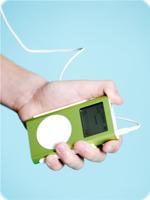While music can definitely be our friend, listening to music that is too loud over a prolonged period of time can be our enemy – or rather an enemy to the
Rising Trend
Try enjoy music and take care about your health at the same time. Personal MP3 players have become so popular that not only teenagers have adopted them as a constant companion, but many other age groups as well. The rising trend attracts people who like to listen to music as they exercise, walk, ride the bus, work, drive, and most any other place you can think of. MP3 players are small, lightweight and convenient to take along. The problem with these devices is that having small earphones stuffed in your ears while playing loud music can be harmful to your hearing and not good for your health. Clinical studies have shown that using small earbuds that are inserted inside the ear creates a sound that is nine decibels higher than that of regular headphones that cover the whole ear. Nine extra decibels doesn’t sound like a lot, but an example of the difference in sound is that of an alarm clock to a lawn mower. Another problem is that the type of earphones that fit inside the ear are not as good at blocking out background noises, giving the listener more reason to crank up the volume.
Earbuds and headphones direct a virtual cyclone of sound down the ear canal. This barrage of noise crashes into tiny hair cells called cilliae, deep inside the ear. Cilliae are the structures that translate vibrating air into the nerve impulses that our brains interpret as sound. Continuous loud noise can damage these sensitive structures. The consequences can be hearing loss, deafness, or even tinnitus - a constant, frustrating ringing in the ears.
So, how loud is too loud for your health?
Don't lisen music too loud to keep your ears are healthy If you can’t hear conversations that are happening around you, or other people can hear your music, or you find yourself yelling or talking loudly to people nearby, then it’s too loud. Audiologists made a rule to help you keep your hearing and still enjoy music. They call it the 60 minute/60 percent rule. It recommends that you set your player at no more than 60 percent of its maximum volume, and that you listen for no more than 60 minutes at a stretch. Think about this: a recent study compiled in Australia showed that a quarter of the listeners between the ages of 18 and 54 are listening to music at levels that could potentially cause long-term hearing loss.
Any sound higher than 90 decibels can cause long-term hearing loss if the sound is extended. Fact – most MP3 players have the technological capabilities of reaching 120 decibels. That is equivalent to a jet engine.
To give you an idea of noise level decibels, a normal conversation is 60 decibels, an airplane taking off is 110 decibels, and personal music players (at high volume) is 105 decibels. Imagine listening to music all day long that is as loud as a jet taking off!
Health Penalties
Hearing disorders can have spiraling consequences that include social isolation and limited career and educational opportunities. And the irony of self-imposed hearing loss is it can keep you from being able to enjoy music.
This article is not a campaign to get everyone to stop using their MP3 players, but just a few words of concern about using common sense. Use moderation when listening to your MP3 player – turn down the sound a little and don’t listen to it for long periods of time. Give your ears a break every now and then. The reward will be that you can listen to music for many years to come.
A note to parents:
Apple has introduced sound-limited software for its iPod products. Parents can use it to set safe levels for their children.



